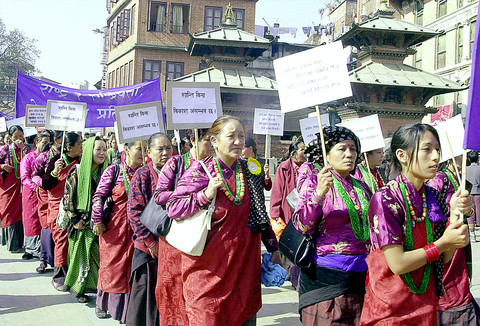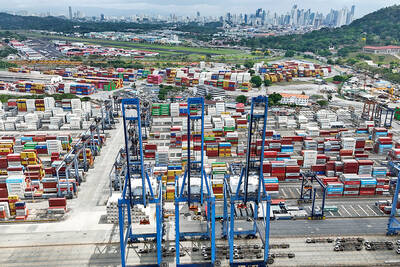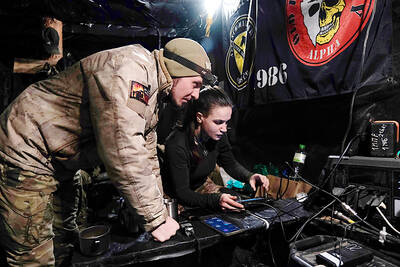Nepal's government invoked anti-hoarding and price control laws to stem rises in food and fuel prices as a Maoist blockade of the capital entered a third day, state-run radio announced yesterday.
The indefinite blockade, to protest the disappearance of activists in army detention, halted most traffic on Kathmandu's main north and west arteries.

PHOTO: AFP
In response, the federal Cabinet late Friday appointed a 14-member committee, headed by the prime minister and including the finance and home ministers, to monitor food and fuel supplies at markets in the capital for the next two months to stem a growing black market, state-run radio said.
"The committee will make provisions of stocking up fuel and other essential items for at least two months and take records of supplies of those items in stock with businessmen," state-run radio said.
The capital region in the Kathmandu valley consists of three cities -- Kathmandu, Bhaktapur and Lalitpur -- with 1.5 million residents.
A third highway, the Mahendra which heads east from the capital to India, is partially blocked in southeastern Nepal, transport owners said, adding that most traffic to and from Kathmandu had been brought to a halt.
On Friday, two soldiers were killed and two injured while clearing mines planted to block the highway west of the capital, an army source said.
"The uncontrolled market has shot up consumer prices 25 to 70 percent within two days following the Maoist's blockade," said Nepal Consumer's Forum president Harendra Bahadur Shrestha.
Kathmandu residents facing their second rebel blockade in five months are hoarding food and oil in response, Shrestha said.
In August the Maoists staged a week-long blockade of the capital, spreading fear among the inhabitants and sending produce prices soaring.
"There is sufficient amount of food, petroleum products and other essential goods in stock for at least 10 weeks," Shrestha said.
The move by the rebels -- who are fighting to topple the monarchy and create a communist republic -- comes as King Gyanendra cancelled a scheduled 11-day visit to India on Thursday, citing the death of former Indian prime minister P.V. Narasimha Rao.
The government has set a Jan. 13 deadline for the Maoists to open negotiations. The king has said new elections would be held if they continued to resist talks.
Almost 450 people have been killed in insurgency-related violence in Nepal in the past three months, a human rights group said on Friday.
It has been the bloodiest period since the insurgency -- which has claimed more than 11,000 lives -- began in 1996, Subodh Pyakurel, president of the Informal Sector Service Center, said.
On Thursday UN Secretary General Kofi Annan called for an immediate end to the deadly fighting in Nepal and expressed concern at reports of human rights abuses.

THE TRAGEDY OF PUNCH: Footage of the seven-month-old Japanese macaque has gone viral online after he was rejected by his mother and formed a bond with a soft toy A baby monkey in Japan has captured hearts around the world after videos of him being bullied by other monkeys and rejected by his mother went viral last week. Punch, a Japanese macaque, was born in July last year at Ichikawa City Zoo. He has drawn international attention after zookeepers gave him a stuffed orangutan toy after he was abandoned by his mother. Without maternal guidance to help him integrate, Punch has turned to the toy for comfort. He has been filmed multiple times being dragged and chased by older Japanese macaques inside the enclosure. Early clips showed him wandering alone with

Australian Prime Minister Anthony Albanese yesterday said he did not take his security for granted, after he was evacuated from his residence for several hours following a bomb threat sent to a Chinese dance group. Albanese was evacuated from his Canberra residence late on Tuesday following the threat, and returned a few hours later after nothing suspicious was found. The bomb scare was among several e-mails threatening Albanese sent to a representative of Shen Yun, a classical Chinese dance troupe banned in China that is due to perform in Australia this month, a spokesperson for the group said in a statement. The e-mail

‘OCCUPATION’: Hong Kong said it had lodged ‘stern protests’ with Panama’s consulate, and would ‘staunchly support’ the rights and interests of Hong Kong companies Panamanian President Jose Raul Mulino on Monday ordered the temporary occupation of two ports run by a unit of CK Hutchison Holdings Ltd following the Supreme Court’s ruling against the firm’s concession, escalating a dispute that has become a proxy battle between the US and China in Latin America. Mulino said in a speech that the administration and operation of the two ports on the strategic Panama Canal is to revert to the country’s National Maritime Authority to ensure their uninterrupted, safe and efficient operation. The occupation covers movable equipment at the ports and does not mean a definitive loss of

GAME CHANGER The Russian invasion of Ukraine has shown the utility of small drones for recon, for supporting logistics and for killing across the modern battlefield Five European nations have announced a new program to produce low-cost air defense systems and autonomous drones using Ukrainian expertise, hard-won over the past four years fighting against Russia. Friday’s initiative of the five nations — France, Poland, Germany, the UK and Italy — comes as one of many European efforts to bolster defense along their borders, like a “drone wall ” with Russia and Ukraine to better detect, track and intercept drones violating Europe’s airspace. Both Moscow and Kyiv have cutting-edge drone warfare capabilities forged in the grim laboratory of war where battlefield innovations have rewritten modern battle tactics. Poland is